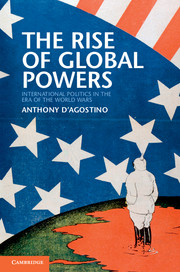Book contents
- Frontmatter
- Contents
- Maps
- Acknowledgements
- Introduction
- 1 The great powers at the dawn of world politics
- 2 Global origins of World War I: from the China scramble to the world crisis of 1904–1906
- 3 Global origins of World War I: a chain of revolutionary events across the world island
- 4 Balance and revolution, 1914–1918
- 5 A ragged peace, 1919
- 6 Scramble for Eurasia, 1919–1922
- 7 Drastic acts of unhappy powers, 1922–1923
- 8 Storms in the lull, 1924–1927
- 9 Politics and economics of the great slump, 1928–1933
- 10 A vogue for national economy
- 11 Mussolini’s moment, 1933–1935
- 12 The global civil war, 1936–1937
- 13 Last years of peace, 1937–1939
- 14 The European war, 1939–1941
- 15 The world war
- 16 Balance and hegemony
- Maps
- Notes
- Index
3 - Global origins of World War I: a chain of revolutionary events across the world island
Published online by Cambridge University Press: 05 June 2012
- Frontmatter
- Contents
- Maps
- Acknowledgements
- Introduction
- 1 The great powers at the dawn of world politics
- 2 Global origins of World War I: from the China scramble to the world crisis of 1904–1906
- 3 Global origins of World War I: a chain of revolutionary events across the world island
- 4 Balance and revolution, 1914–1918
- 5 A ragged peace, 1919
- 6 Scramble for Eurasia, 1919–1922
- 7 Drastic acts of unhappy powers, 1922–1923
- 8 Storms in the lull, 1924–1927
- 9 Politics and economics of the great slump, 1928–1933
- 10 A vogue for national economy
- 11 Mussolini’s moment, 1933–1935
- 12 The global civil war, 1936–1937
- 13 Last years of peace, 1937–1939
- 14 The European war, 1939–1941
- 15 The world war
- 16 Balance and hegemony
- Maps
- Notes
- Index
Summary
The road to the Great War led from of the alignment of powers that came out of the scramble for concessions in the Far East. The world crisis of 1904–6 shaped the alignments roughly into the form they took in 1914. It only remained to shift the locus of the confrontation, by a chain of revolutionary events, across the world island into Europe. After Russia’s defeat in the war with Japan, the two had little difficulty dividing their Asian spheres of influence. Japan made a similar settlement with the French. Japan was at this point in effect a member of the looming Triple Entente. It also attempted to settle matters with the United States. By virtue of the American victory over the Philippine insurgents in 1902, the American and Japanese spheres faced each other warily across the Luzon Strait that divides the Philippines from Formosa. Worldly Japanese knew that their relations with the USA would not go smoothly once the Panama Canal, on which the United States was working and which would be completed by 1914, was able to shift the American fleet to Asian waters. This was underlined when Theodore Roosevelt sent the Great White Fleet around the Horn, into the Pacific, and around the world in 1908. Roosevelt had hoped that a show of force would quiet Japanese indignation about unfavorable American immigration policies, yet the United States at bottom had neither the wherewithal nor the inclination to oppose Japanese dominance of Asia.
The Great War itself did not finally break out in the Far East, but rather in the Near East, that is, in the Ottoman Balkans, because of the spread of the international effects of the Russo-Japanese war across the Eurasian ecumene. The vehicle for this was the Russian revolution of 1905. As would be the case in 1917, revolution had grown out of military defeat. What was more, it was the defeat of a European great power by a non-European state. As such it sent a thrill throughout the world outside Europe, or at least through the hearts of the revolutionary intelligentsia of that world. It was a bigger and more dramatic version of the defeat of the Italians in Abyssinia in 1896.
- Type
- Chapter
- Information
- The Rise of Global PowersInternational Politics in the Era of the World Wars, pp. 48 - 76Publisher: Cambridge University PressPrint publication year: 2011



